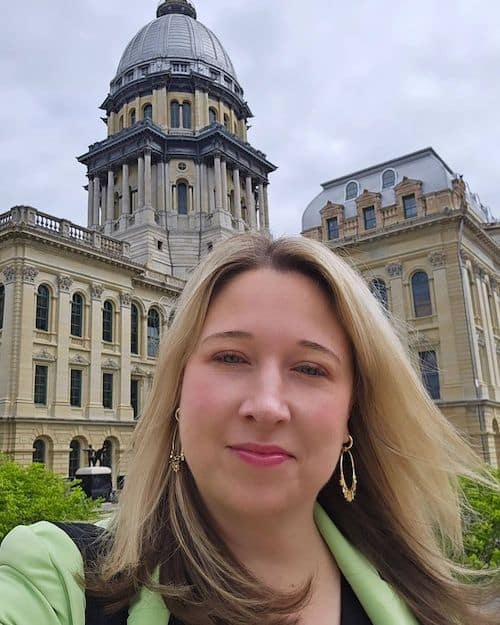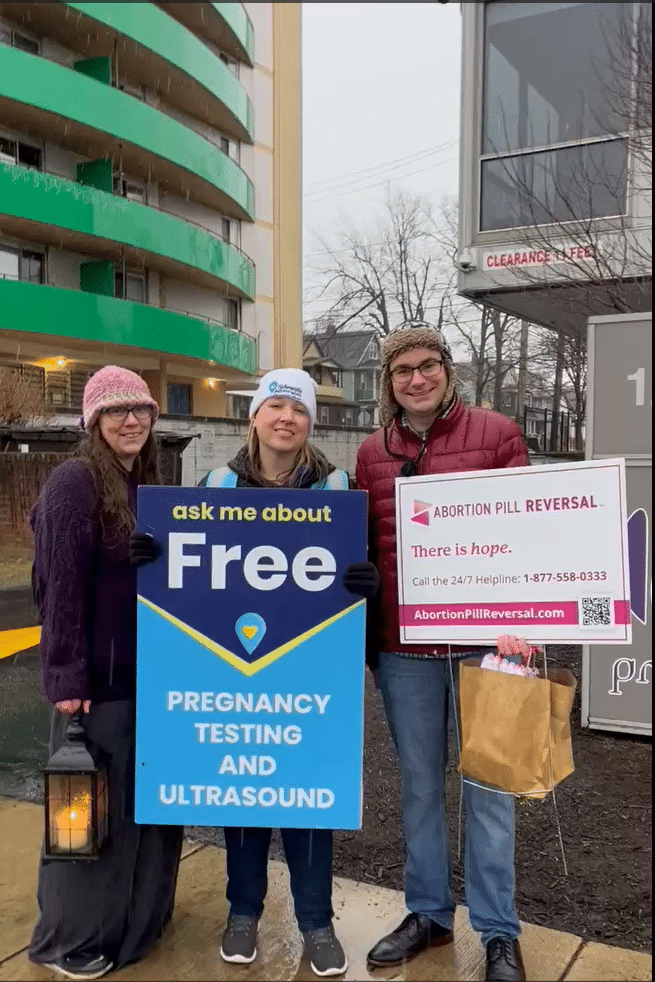Volunteers with Sidewalk Advocates for Life (SAFL) — a pro-life nonprofit that identifies as America’s largest sidewalk outreach organization — regularly encounter women seeking abortion on the sidewalks outside of abortion clinics. Now, in response to the abortion pill, the group is planning something new: ministering to women online.
“The goal is that, wherever women are, we will still be,” said Lauren Muzyka, the president and CEO of SAFL, a group that seeks to end abortion by training, equipping and supporting communities across the nation and worldwide in sidewalk advocacy.

Muzyka spoke with Our Sunday Visitor as SAFL celebrates its 10th anniversary — and more than 22,000 lives saved from abortion — this year. Through peaceful, prayerful advocacy, SAFL strives to be the hands and feet of Christ while offering life-affirming alternatives to abortion.
They estimate that 777 abortion and abortion referral locations exist nationwide and that they cover 35% of them, Muzyka said.
“Our goal is to see that there’s no one walking into one of these facilities without God’s people outside of it,” she stressed. “To offer that mother and that family real help and hope.”
Today, SAFL’s ministry is evolving to meet a changing landscape. Women seek abortions not only at brick-and-mortar clinics but also online, through the mail, and even at local pharmacies like CVS and Walgreens.
Women are online “asking a lot of questions and trying to get support when they’re facing an unexpected pregnancy,” Muzyka said. “How wonderful would it be if we could be there equipped and trained to help them online as well.”
Responding to the abortion pill
Muzyka called responding to the abortion pill the “new frontier for the pro-life movement.”
Earlier this year, a study by the Guttmacher Institute, a reproductive research organization that supports abortion, estimated that abortion pills made up 63% of U.S. abortions in 2023, an increase from 53% in 2020.
The U.S. Food and Drug Administration first approved the drug mifepristone, which is paired with another drug, misoprostol, for earlier abortions in 2000. Currently permitted for use through 10 weeks gestation, this type of abortion is also called the abortion pill, chemical abortion, medication abortion or telemedicine abortion.

In mid-June, the Supreme Court unanimously dismissed a challenge to mifepristone in the first major case concerning abortion that it agreed to hear after Dobbs v. Jackson Women’s Health Organization. In 2022, the Dobbs decision overturned the court’s 1973 ruling in Roe v. Wade that previously legalized abortion nationwide, freeing individual states to decide abortion policy.
At SAFL, they plan to expand their ministry from the sidewalks to online.
“We are presently working on a plan to deploy teams of online sidewalk advocates who will go into chat rooms and different forums where women are asking where they can get the abortion pill and connecting them with resources such as OptionLine.org,” she revealed. Option Line, a 24/7 pregnancy helpline, is managed by Heartbeat International, which includes a network of more than 3,000 pregnancy help organizations.
Muzyka said that they are in the preparation stages.
“The idea is, we are seeing women, for example, in BabyCenter chats, asking questions on pregnancy boards, on social media,” she said, “so we’re kind of collecting information on all the places where women are chatting with other women about what to do and where to get help.”
A natural extension
At the same time, Muzyka said, sidewalk advocates and the national team have already been connecting with women online for years.
“A lot of times, we get connected randomly with a woman across the United States and our only point of contact is some sort of private messenger or it might be a phone number or text,” she said.
Their program, based on human principles and natural law, easily transfers from the sidewalk to online, she said.
“We have so many people who go through our training who say, ‘You know what? This works on and off the sidewalk. This helped me to help my cousin to choose life, to help my sister to choose life, a friend across the United States to choose life,'” she said. “So just kind of coming together and saying, ‘Hey, we’re going to have a more concerted, a more purposeful outreach to meet women where they’re at online’ — it really is just a natural extension of our ministry.”
A presence at pharmacies
Muzyka also addressed abortion pills dispensed at pharmacies. SAFL, she said, recently disseminated information so that pro-life advocates know how to help women who have picked up abortion pills at their local pharmacy.

“A lot of times they’re getting a script or something from a doctor — again online or at one of these facilities — and so we still have a presence there,” Muzyka said. “But when [a woman] ends up at the pharmacy, what we’re trying to do is disseminate information to everyone possible about how you have a conversation right outside of Walgreens or CVS.”
The information they released, she said, includes talking about where to have that conversation, referring women to OptionLine.org and letting them know that there’s a nearby pregnancy center.
The beginnings of SAFL
Reflecting on their 10th anniversary, Muzyka revealed what led her to found SAFL. As a student at Texas A&M University in College Station, Texas, she had the opportunity to pray in front of the local, newly-built Planned Parenthood building.
“As a student, realizing that life is our foundational right — that without life we have nothing else — I thought this is something I can do,” she remembered. “I can go pray and reach out and give witness to what’s going on inside this building.”
Outside, she remembered watching woman after woman going in and seeing “lots of interesting things” on her side of the fence, from people dressing up in costumes to carrying angry signage.
“I would just cry out to God so many years, ‘Lord, help me to understand how to best reach these women. I want to help them. I want to be there for them and their families. I want to help them to know about life and life abundant,'” she remembered.
God answered her prayer, she said, when the very first 40 Days for Life campaign showed up. The internationally coordinated 40-day campaign seeks to end abortion through prayer and fasting, community outreach and a peaceful all-day vigil outside of abortion clinics.
“Witnessing the transformation in our community, how the atmosphere went from something that was very apprehensive and chaotic and disorganized to something that was very peaceful, prayerful and purposeful, I was hooked,” Muzyka said.
After attending law school, she worked for 40 Days for Life as a campaign strategist before seeing a need — and feeling the call — to start SAFL.
“Just as 40 Days for Life had provided … a ready-made program for people who want to have this concentrated time of prayer in front of an abortion facility, I thought, what if we could do the same thing for sidewalk counselors — those who want to learn how to reach out with their words?” she recalled.
They launched on April 1, 2014. Now, 10 years later, they count more than 22,00 babies saved, 282 U.S. locations, 99 workers who have left the abortion industry and 55 closed abortion facilities.
A real impact
Muzyka stressed that some of the numbers are likely higher.
“The 22,400 babies that were saved, those are just the ones that we know about,” she said. “There’s no doubt that there’s a lot more that have been saved that we’ll never know about this side of heaven.”
Sometimes, she revealed, their advocates meet the babies they helped save.
“In just the past six months, we’ve had a few different sites all over the country where a mother or father stopped the car … and said, ‘Hey, my girlfriend or I was walking into this abortion facility several months ago and you guys were out here and I want you to meet my son or daughter,'” she said.

Muzyka said that the advocates support the women and parents they encounter outside of abortion clinics for as long as they want and however they need. She remembered when she and members of the national team spoke with one couple outside an abortion clinic in Tampa, Florida, a few years ago. That couple ended up choosing life for their baby boy and the SAFL team became friends with them, threw them a baby shower and even did a photo shoot with them. The couple went on to get married and now have another child, a little girl.
Understanding the women seeking abortion
Muzyka emphasized the importance of understanding the women they encounter on the sidewalk.
“The mother who’s headed in there rarely is somebody who says, ‘I just want to have an abortion today,'” Muzyka said. “She is in crisis. She’s in self-preservation mode.”
“For us to have compassion for that — not that it justifies the choice of abortion — but really just loving them both and just understanding that we are all sinners saved by God,” she said, adding that they offer women a real choice by providing options and resources.
Muzyka shared her message for any woman who might be considering abortion.
“For anybody who may be struggling right now with the news that they’re facing an unexpected pregnancy, my words to them are, ‘You are not alone,'” she said. “There are people who care for you, there is real help and hope for you, you do have resources and options.”
She encouraged women to check out resources from their pregnancy help partners, including OptionLine.org, again, and PregnancyDecisionline.org.
“We are there for you and your child,” she said. “Please just don’t hesitate to reach out and let us know how we can be there for you.”







